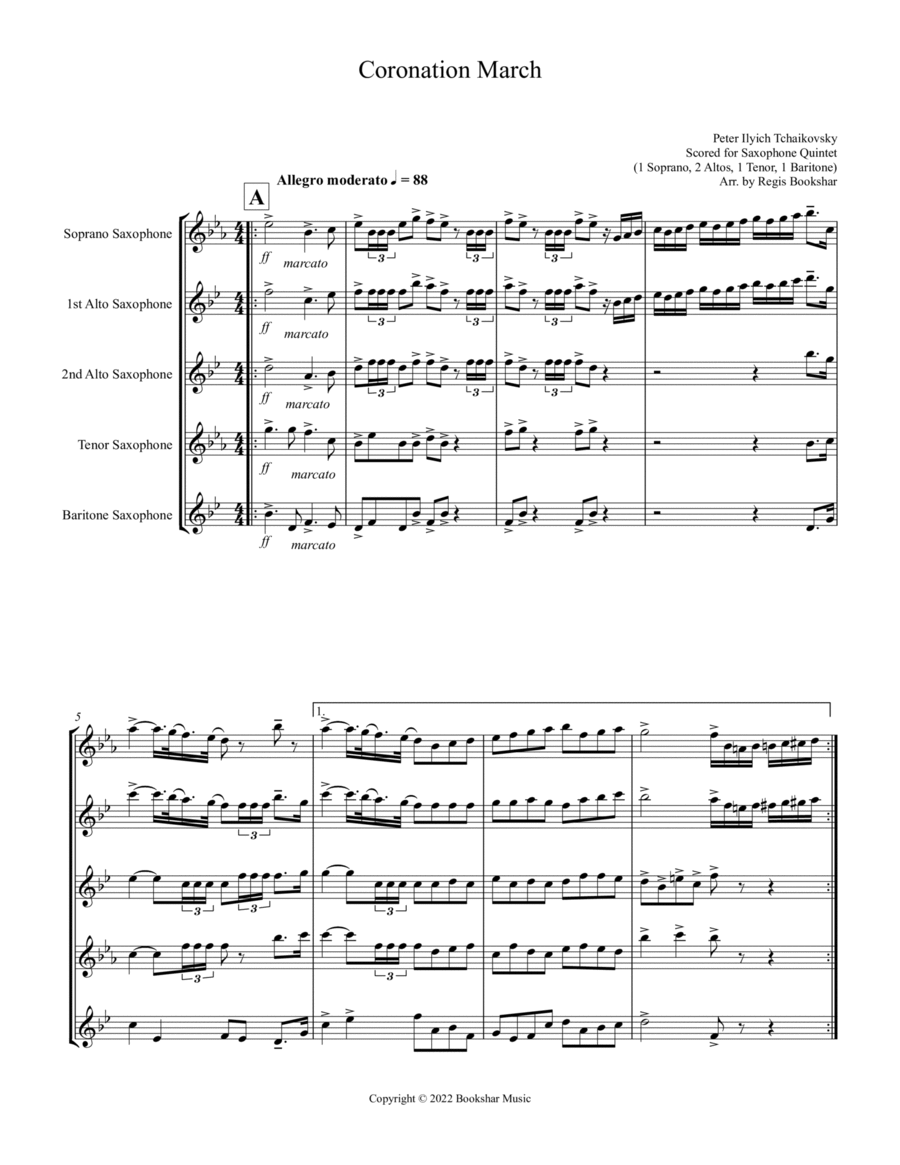Saxophone Quintet,Woodwind Ensemble Alto Saxophone,Baritone Saxophone,Soprano Saxophone,Tenor Saxophone - Level 4 - Digital Download SKU: A0.1083740 Composed by Peter Ilyich Tchaikovsky. Arranged by Regis Bookshar. Classical,Contest,Festival,Instructional,Multicultural,Romantic Period,World. 16 pages. Regis Bookshar #687941. Published by Regis Bookshar (A0.1083740). Coronation March, TH 50, CW 47 by Peter Ilyich Tchaikovsky. Saxophone Quintet - Advanced/Intermediate - Digital Download. This marvelous arrangement of Peter Tchaikovsky's Coronation March, sometimes called Festival March or Festival Coronation March, would be a fabulous addition to any music library and could be performed for concerts, recitals and other festive occasions. This arrangement keeps all of the intensity and excitement of the original composition and is suitable for high school and college students. Professional musicians would also enjoy playing this selection. Included are a score and a complete set of parts (16 pages). This selection is one of the many arrangements from The Regis Bookshar Trumpet Ensemble's extensive music library which are being made available to the public for the first time. The Coronation March was ordered by the city of Moscow for the coronation of Tsar Alexander III in 1883. It was written during March of 1883 and was performed for the first time on June 4, 1883 in Sokolniky Park in Moscow, conducted by Sergei Taneyev. The music then included excerpts of the anthem, God Save the Tsar. The American premiere was on May 5, 1891, for the opening concert of Carnegie Hall in New York City, conducted by Tchaikovsky himself. During the Soviet Era, Russian performances and recordings of the music were revised to omit the excerpts from the Czarist national anthem, replacing it with thematic material used earlier in the march, due to an official Soviet ban on the anthem. Starting with Dmitri Medvedev's inauguration in 2008, an abbreviated version of this piece is played during the Russian presidential inauguration accompanying the entrance of the incoming president, and ends well before the playing in this piece of the Tsarist anthem God Save the Tsar. Unlike Tchaikovsky's other major compositions, the Coronation March does not have an opus number. It has been given alternative catalogue designations TH 50 and CW 47. Tchaikovsky's Coronation March was originally scored for a full orchestra and written in the key of D Major. Regis Bookshar has now created an abbreviated version, written in Db Major, and has arranged it for a Saxophone Quintet, consisting of 1 Soprano Saxophone, 2 Alto Saxophones, 1 Tenor Saxophones and 1 Baritone Saxophone. In addition to this arrangement of Tchaikovsky's Coronation March for a Saxophone Quintet, other arrangements of this festive composition for various instrumental ensembles are also available. Please feel free to search for other arrangements by Regis Bookshar as there are many more arrangements in a variety of styles, also available for purchase. You may find something else which might interest you as well, and please continue to check periodically because new arrangements are being added as often as possible. I'm certain that this wonderful arrangement of Tchaikovsky's Coronation March will continue to entertain both audiences and performers alike for years to come.
